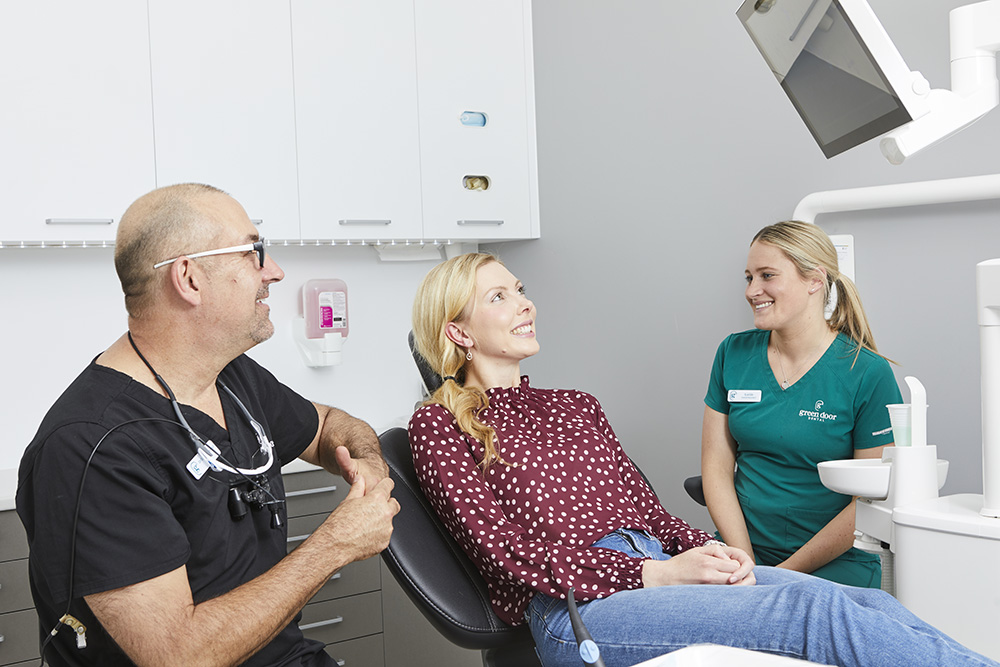
There’s a lot to think about when you fall pregnant. Will I have a boy or a girl? What’s a birth plan? Why do I need to pee so often? Keeping your oral health in check may not be high on your To Do list. But what if you notice blood on your toothbrush?
Bleeding gums after brushing or flossing, as well as swollen and tender gums are all signs of pregnancy gingivitis. Don’t worry though, it’s completely normal. In fact, nearly half of all pregnant women have gingivitis.
What exactly is pregnancy gingivitis?
Pregnancy gingivitis is a mild form of gum disease, caused by a build-up of plaque along the gumline.
During pregnancy your hormones surge. This increases the blood flow to the gums and can cause them to become swollen and tender. After brushing or flossing you may notice blood. Typically, bleeding gums happen during the second trimester, and may worsen during the third trimester.
But the good news is that there are ways to look after your teeth and gums throughout your pregnancy.
How to prevent bleeding gums in pregnancy
Most of the changes in pregnancy come from a rise in hormones. Think increased appetite (hello, weird cravings!), nausea, and tiredness—not to mention mood swings. You can’t control your hormones, but you can take a few actions to help prevent or ease pregnancy gingivitis.

Let’s start with good oral care
The easiest and most effective way to prevent bleeding gums when pregnant is to practice good oral hygiene. Brush your teeth twice daily with fluoride toothpaste. Don’t forget to clean in between teeth with dental floss or interdental brushes.
If you notice your mouth is dry, try chewing a sugar-free gum. This increases saliva, which neutralizes the acid in the mouth and reduces plaque build-up on teeth.
After becoming pregnant, some women suddenly find the taste of toothpaste makes them feel sick or gag. (Thanks, pregnancy hormones!) Brushing with water alone may be easier on your taste buds and less likely to cause gagging.
Or perhaps morning sickness is stopping you from brushing? Try brushing your teeth at a different time of the day when the nausea may be milder. Oh my, do those hormones have a lot to answer for!
Eat a healthy & balanced diet
Food cravings may have you reaching for sugary ‘sometimes’ foods. Meanwhile, morning sickness might steer you towards starchy snacks. Instead, try to choose healthy, fresh foods and eat a balanced diet. Try to include the following vitamins and minerals:
Vitamin C
Find it in brightly colored fruits and veggies such as carrots, oranges, sweet potatoes, berries and broccoli.
Oral health benefits: boosts collagen production to keep teeth and gums strong.
Vitamin D
Find it in oily fish like tuna, mackerel, and salmon—as well as egg yolks and fortified foods.
Oral health benefits: helps calcium absorption, which is good for strong bones and teeth.
Calcium
Find it in dairy foods, as well as green leafy veggies.
Oral health benefits: keeps teeth and bones strong.
Taking a daily pregnancy supplement? Great job! This provides a range of vitamins and minerals that not only support bub’s development, but also your oral health.

Give a home remedy a go
Noticed some tenderness or blood when brushing? Try using salt as a medicine. Mix 1 teaspoon of salt in a cup of lukewarm water. Rinse the mixture around your mouth and spit it out. Salt may help lessen the swelling caused by gingivitis and speed up healing.
Don’t skip your dental visit
You do see your dentist regularly, right? If you have delayed booking in for your routine check-up, don’t worry—it’s completely safe to have a professional dental check-up and clean during pregnancy.
In fact, it’s recommended that mums-to-be have their oral health checked at least once during the journey to motherhood. This gives you the opportunity to ask about any dental concerns. It’ll also help stop minor issues from becoming more serious problems down the track.
Possible complications
If left untreated, pregnancy gingivitis may lead to periodontitis. This is an advanced form of gum disease that can cause tooth loss and other health problems. Some research also suggests there may be a link between periodontitis and premature birth and low birth rate. However, this is an area that needs more research.
In many cases, swollen and bleeding gums heal naturally once bub is born. But by taking extra care of your oral health during pregnancy, you can worry less and enjoy preparing for your new bundle of joy.



























